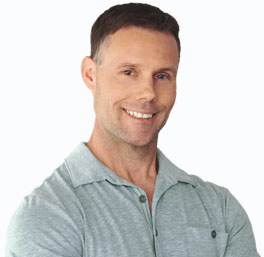Table of Contents
The basic premise or take away from intuitive eating is healing your relationship with food.
Believe me, I can appreciate listening to your body and making smart choices without limiting food types. All of our lives, we’ve been conditioned to think about food. So it’s difficult to disconnect food from our emotions.
I sincerely believe there is a method and mindset for every unique individual in existence. But I’m really not a big fan of this method to achieve specific goals. It takes a more psychological approach to energy consumption.
In my experience, most clients are looking to improve health for a very specific reason. A list includes:
- They want to eliminate a medication
- Their joints hurt from having excess weight
- They’re looking for faster weight loss
- They want to build more muscle
- They want to change their poor blood chemistry
- They’re working around a food allergy
Only a handful of people have ever said to me, “I want to change my mental outlook about food.”
If you’re one of those people, then you might be barking up the right tree with intuitive eating. It may help if you’re someone without control eating patterns, and need more of a psychological approach. But it will be a very long road.
Otherwise, I’m finding it difficult to find any structure for the methodology. In other words, it seems vague. So, can I eat pizza and ice cream every day? Technically, yes.
What is the history of intuitive eating?
Intuitive eating was created by two dietitians (Evelyn Tribole and Elyse Resch) in 1995 and was described as weight-neutral. They then created a system that could be duplicated and taught to other dietary counselors as a certification to help more people.
This leads to my biggest problem with intuitive eating regardless of it being effective or not. There’s a big financial return for groups who certify others in their system. It’s similar to franchising your product.
I always question an individual’s agenda when they come up with a style of eating or exercise, slap a label on it, and then sell it to the public or license it. Perhaps, that’s not what these two are about, but I still question everything.
I believe that one of the most fundamental problems stems from poor food choices. And real change can be elicited by eating and avoiding specific foods, period.
10 Principles of intuitive eating
I copied each principle verbatim and addressed each from my perspective.
Reject the diet mentality
I agree that one should avoid fad diets and eliminate the “going on a diet” mentality. I instead encourage people to find a dietary pattern that works for their lifestyle and will keep them healthy. This varies because everyone has different circumstances and schedules.
Honor your hunger
There’s an awful lot of emerging research about hunger. When I design a meal plan, I try to find specific times during the day that are convenient for the individual. Rather than just waiting until one is hungry, in reality, it makes more sense to eat on a schedule.
We are creatures of habit. If we didn’t work and have to succumb to a weekly schedule, listening to your hunger would be perfect. That said, don’t force feed yourself with an unrealistic schedule.
Make peace with food
This principle simply states there are no good or bad foods and that deprivation leads to the uncontrollable desire for that particular food. I agree there are no “superfoods,” but I disagree about bad foods. Please don’t misunderstand my statement. My intention is not to eliminate anything from one’s dietary arsenal, but rather control its placement.
High sugar and heavily processed foods have no place in one’s diet 95% of the time. Save those foods for your break meal. This may sound a bit extreme, consumption of junk food always leads to the desire for more junk food. The neurochemical response is real and it’s powerful. If this is you, intuitive eating may not be right for you.
Challenge the food police
This basically states that you should ignore your internal dialogue about feeling bad for consuming bad food and feeling good for consuming good food. I agree to a point. Since I like to promote a positive outlook, I see nothing wrong with feeling good about consuming foods that are nutrient dense and healthy.
My guess is that this is not the exact point. Rather, the point is to not allow this internal dialogue to dictate feelings of guilt or pleasure.
Feel your fullness
This states that one may feel the need to finish everything on their plate because it’s “meal-time.” And there will be no more food until the next meal. Again, scarcity is addressed.
I agree with a portion of this principle. But I prefer the perspective of following a plan that uses quantifiable feedback to obtain necessary nutrients and adequate fullness. Not a stuffed feeling. This occurs with trial and error.
Discover the satisfaction factor
This states that when you eat what you want, your feeling of satisfaction will be content. Again, in my experience, if this particular food is high in sugar, the satisfaction is short lived and cravings continue. There’s so much junk on grocery store shelves now, that an avoidance of the products is superior.
Cope with your emotions without using food
I completely agree that we need to find alternatives to food when dealing with specific emotions. This is a tough one to break since it’s usually created during childhood. It will certainly take some inflection and hobby seeking.
Respect your body
This simply states that one should respect their physical self as they are currently. In other words, stop criticizing your physical body. I agree, wasting energy on physical criticism only creates negative feelings. Accept who you are and focus your energy on finding ways to be healthy.
Exercise: feel the difference
This states that you should forget about the calorie burning effects of exercise. It also states to avoid doing the exercise you dislike just because it’s good for you. Rather, do the type of exercise that you enjoy and that makes you feel good.
I couldn’t agree more! In fact, I could care less how many calories are burned or how much of an oxygen deficit you’re in for the rest of the day. Picking an exercise that you enjoy is crucial. I happen to like fast-paced strength training and hiking long distances. So, that’s what I use for exercise. Do what gets you moving and makes you feel happy!
Honor your health with gentle nutrition
This states that eating perfectly does not necessarily equate to perfect health. But it sure is a good start! And that one bad snack here and there won’t make you unhealthy. This is true. And I’m all for it if one bad snack doesn’t elicit additional overwhelming cravings.
But that’s the point of intuitive eating… to learn to manage those feelings. I come across a lot of people who have great success with the “all or nothing” principle. But those people are few and far between. And if you’re that person, intuitive eating is likely not for you.
My perspective on intuitive eating
I have not encountered too many people who could realistically follow this philosophy without overeating.
Yes, there are certain personalities for which this style would fit. When I work with someone like this, I tend to throw the meal plan concept “out the window” and teach them about making smart food choices and to listen to their body.
However, I’m a science guy with a background in the chemistry of our metabolism. I can’t help but approach most people’s dietary goals from a quantifiable and research-backed methodology.
And, many of the problems arise because people have made poor food choices. Not deliberately, of course. Usually from a misguided education.
Numbers don’t lie
The old adage, “you are what you eat” is a reality. Numbers don’t lie, period.
There are ways to alter your blood chemistry and body composition significantly with food. There’s also copious amounts of research compiled over the years to confirm this statement. And the outcomes are quantifiable.
When a client comes to me and tells me they need to raise their HDL and drop their LDL, I know what to eliminate and add to their current plan. Then I make the plan work with their schedule.
I can’t make these changes simply with intuitive eating. I can apply some of the principles, but not exclusively.
My job is to offer a solution to a specific need. One’s mindset is transformed as they see quantifiable results and behavior is slowly modified through practice. I see it happen a lot.
What’s the best method for you?
I’m giving you my educated perspective on intuitive eating.
I would like to get you to think about who you really are. If the above principles fit you, and you’re looking to change your approach to eating, then maybe it’s worth a try.
Keep in mind though, it probably won’t help you reach your goals.
If you’re the type of person who works well with a schedule and likes to quantify things, a specific meal plan (not necessarily a diet) that changes as you make progress is probably more suitable.
Conclusion on intuitive eating
Again, you can see that the basic premise or take away from intuitive eating is healing your relationship with food. But you can still heal your relationship with food while learning to eat with a progressively changing meal plan.
It’s a good way to learn how to eat well and how your body responds to certain foods with a definitive plan. However, few goals are ever obtained without a road map.
There’s no perfect “one size fits all” style of eating for good health. But there are a lot of different methodologies well suited for different individuals.
Whether one finds success through a low carb meal plan, ketogenic meal plan or intermittent fasting plan, they all have their application. We’re all unique and recognizing what type of person you are is important in deciding the best approach.
I can’t recommend intuitive eating to too many people.
Some of the principles, yes. But not all.


![What is Intuitive Eating? [Should You Consider It?] 1 10 Principles of Intuitive Eating](https://www.gymfailedyou.com/wp-content/uploads/2019/04/intuitive-eating-diet-mentality.jpg.webp)
![What is Intuitive Eating? [Should You Consider It?] 2 Honor Hunger Intuitive Eating](https://www.gymfailedyou.com/wp-content/uploads/2019/04/intuitive-eating-hunger.jpg.webp)
![What is Intuitive Eating? [Should You Consider It?] 3 Peace Food Intuitive Eating](https://www.gymfailedyou.com/wp-content/uploads/2019/04/peace-food-intuitive-eating.jpg.webp)
![What is Intuitive Eating? [Should You Consider It?] 4 challenge food police intuitive](https://www.gymfailedyou.com/wp-content/uploads/2019/04/food-police-intuitive.jpg.webp)
![What is Intuitive Eating? [Should You Consider It?] 5 Feel Your Fullness Eating](https://www.gymfailedyou.com/wp-content/uploads/2019/04/feel-fullness.jpg.webp)
![What is Intuitive Eating? [Should You Consider It?] 6 Eating Sugary Food](https://www.gymfailedyou.com/wp-content/uploads/2019/04/sugar-food-eating.jpg.webp)
![What is Intuitive Eating? [Should You Consider It?] 7 Cope with your emotions without using food](https://www.gymfailedyou.com/wp-content/uploads/2019/04/emotional-eating.jpg.webp)
![What is Intuitive Eating? [Should You Consider It?] 8 Respect your body](https://www.gymfailedyou.com/wp-content/uploads/2019/04/body-positive.jpg.webp)
![What is Intuitive Eating? [Should You Consider It?] 9 Fun Workout](https://www.gymfailedyou.com/wp-content/uploads/2019/04/fun-workout.jpg.webp)
![What is Intuitive Eating? [Should You Consider It?] 10 Gentle Nutrition](https://www.gymfailedyou.com/wp-content/uploads/2019/04/smart-snacking.jpg.webp)


